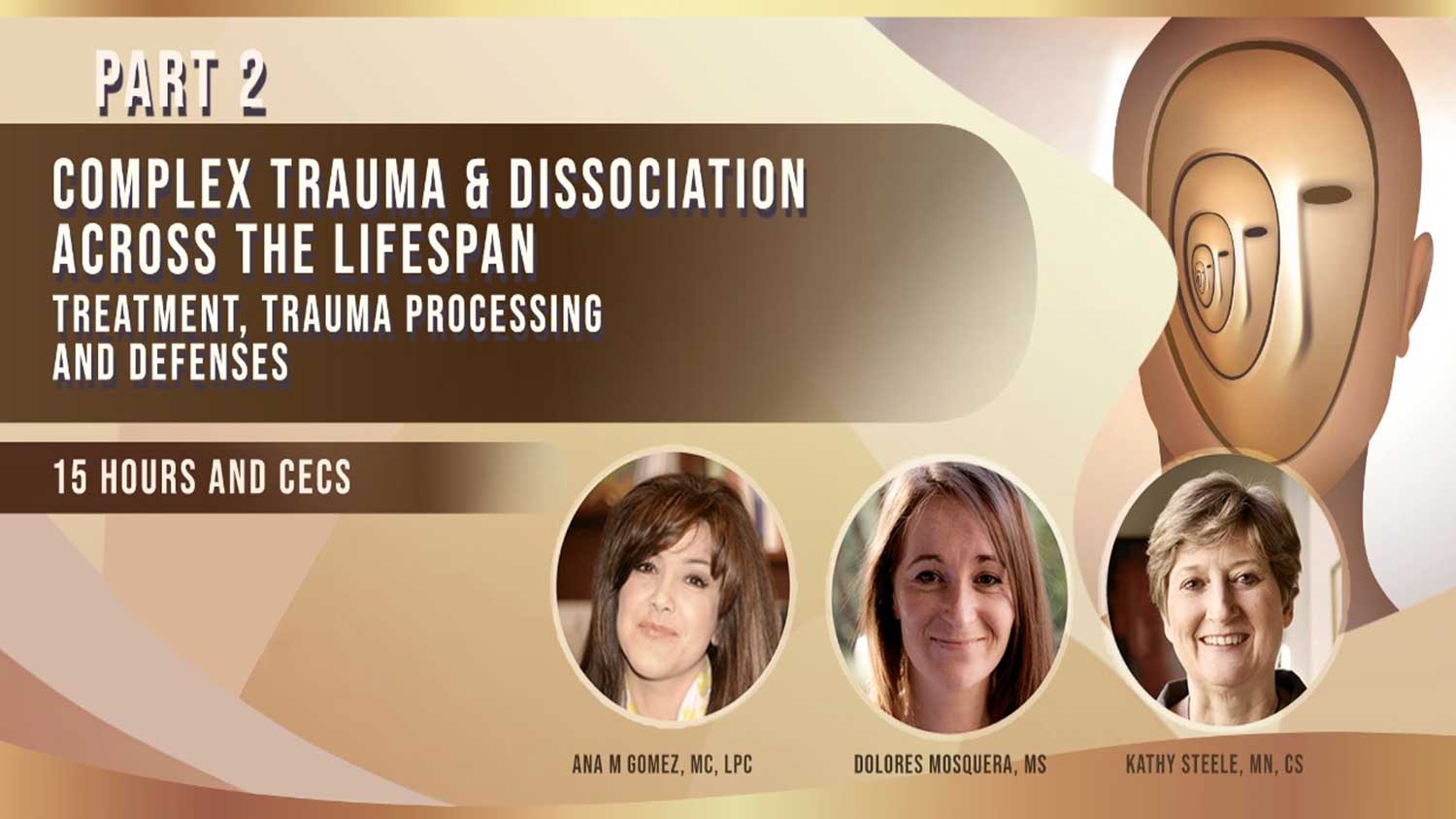
Complex Trauma & Dissociation Across the Lifespan Series, Part Two
The Part 2 training offers advanced treatment tools to work with individuals who have endured chronic and developmental trauma across various developmental stages. Early relational trauma often results in a self-organization that presents with fragmentation, entrenched defenses, trauma related phobias, and deeply rooted internal conflicts. These are often combined with layers of memories of trauma and adversity and an overarching dissociative personality structure.
For these individuals, adaptive information quite often is scarce, limited or even absent.
We will present case conceptualization and therapeutic techniques to work directly with trauma-related phobias and defenses that have the potential to stagnate the therapeutic process. Harmful behaviors will be addressed throughout various stages of development along with strategies to address them.
This presentation will offer portals, access routes and therapeutic strategies that provide titration and a gradual entrance into traumatogenic material. In addition, appropriate methods of treatment will be presented that honor the age-related needs, capacities and demands of our clients.
MODULE 1: Phobias and Resistance
Participants will be able to:
-
-
- Cite strategies that assess trauma-related phobias and resistance
- Utilize strategies to work with avoidance
- Utilize strategies to work with conflicts
- Identify strategies to work with failures to grieve
-
MODULE 2: Suicidality and Self- harm
Participants will be able to:
-
-
- Describe at least 3 examples of self-attacks, self- betrayal and self-hatred
- Utilize strategies to work with suicidality and self-harm throughout multiple stages of development
-
MODULE 3: Working with Defensive Parts and Perpetrator Parts
Participants will be able to:
-
-
- Utilize special approaches to work with highly defended parts
- The avoidance adult self
- Hidden parts
- Parts that express specific defenses
- Utilize strategies to work with perpetrator-imitating parts
- Utilize special approaches to work with highly defended parts
-
MODULE 4: Chronic & Traumatic Shame and Guilt
Participants will be able to:
-
-
- Cite theories that address the origins of traumatic shame and guilt
- Identify elements of the parent-child relationship that contribute to the development of shame
- Utilize strategies to deal with the client’s the inner critic
- Utilize integrative top-down and bottom approaches to treat chronic shame
-
MODULE 5: Memory work
Participants will be able to:
-
-
- Describe at least three markers to establish client’s readiness for trauma work
- Identify three decision- making markers when working with the whole self or particular parts
- Utilize multiple portals and memory entry strategies
- Utilize strategies for titration and pendulation
- Utilize strategies for the layering and fractionation of memory
- Cite markers in the decision-making process for gradual vs rapid entrance into memory networks
-
CE Information
- CE-Classes.com is the provider of CE’s.

- The American Psychological Association (APA) CE-Classes.com is approved by the American Psychological Association to sponsor continuing education for psychologists. CE-Classes.com maintains responsibility for this program and its content.
- Florida Certification Board
- The Florida Board of Clinical Social Work, Marriage and Family Therapy and Mental Health Counseling Provider #852 BAP-Expires 3/31/2023
- The California Board of Behavioral Sciences. The California Board of Behavioral Sciences, BBS, recognizes relevant course work/training that has been approved by nationally recognized certifying bodies, such as APA, to satisfy renewal requirements.
- California Consortium of Addiction Programs and Professionals (CCAPP) Provider Number OS-12-147-0223 Expires 02-2023
- The Texas Board of Social Work Examiners – CE-Classes.com meets the requirements for acceptable continuing education
- The Texas Board of Professional Counselors – CE-Classes.com meets the requirements for acceptable continuing education
- Massachusetts Authorization Number: (TBD)
- Ohio Counselor, Social Worker and Marriage and Family Therapist Board – Provider # RCST031201
- New York Social Work Board – CE-Classes.com is recognized by the New York State Education
Department’s State Board for Social Work as an approved provider of continuing education for licensed social workers #SW-0120. - New York Mental Health Practitioners Board CE-Classes.com, Inc. is recognized by the New York State Education Department’s State Board for Mental Health Practitioners as an approved provider of continuing education for licensed mental health counselors. #MHC-0260.
- New York Psychology Board CE-Classes.com, Inc. is recognized by the New York State Education Department’s State Board for Psychology as an approved provider of continuing education for licensed psychologists #PSY-0211
- The Florida Board of Nursing (CE Provider #: 50-4896) Expires 10/31/2024 Do not send certificates to the Florida Board of Nursing. You must keep this certificate for 4 years.
- The California Board of Registered Nursing. CEP 15647 Expires 11/30/2024.
- This course is NOT available for NBCC credit
- This training does not offer ASWB ACE credit to social workers.
Grievances must be put in writing to Info@anagomez.org or info@agateinstitute.org
ADA assistance: Please contact Jim Mason at info@anagomez.org if special accommodation is required.
